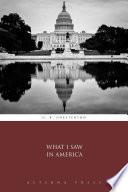
"Fads and Public Opinion"
What I Saw in America (1922)
Context: The truth is that prohibitions might have done far less harm as prohibitions, if a vague association had not arisen, on some dark day of human unreason, between prohibition and progress. And it was the progress that did the harm, not the prohibition. Men can enjoy life under considerable limitations, if they can be sure of their limited enjoyments; but under Progressive Puritanism we can never be sure of anything. The curse of it is not limitation; it is unlimited limitation. The evil is not in the restriction; but in the fact that nothing can ever restrict the restriction. The prohibitions are bound to progress point by point; more and more human rights and pleasures must of necessity be taken away; for it is of the nature of this futurism that the latest fad is the faith of the future, and the most fantastic fad inevitably makes the pace. Thus the worst thing in the seventeenth-century aberration was not so much Puritanism as sectarianism. It searched for truth not by synthesis but by subdivision. It not only broke religion into small pieces, but it was bound to choose the smallest piece.
